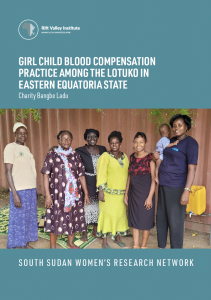Girls and women in South Sudan face numerous barriers and challenges: customary law often denies women the right to own land, girls’ access to education remains precarious and harmful traditional practices continue to place women and girls at risk of gender-based sexual violence. In South Sudan the traditional practice of blood compensation for murder is used by many communities as part of the reconciliation process between families and communities. The legality of the practice, which is often adjudicated through the chiefs’ court system, has been questioned with one former high court judge, Dr. Geri Raimondo, who claimed that ‘The law is clear: any murder case is considered in the High Court, and any murder case that is decided out of the High Court is not considered, and that court does not have jurisdiction, even in the reconciliation process’. One of the more harmful forms of blood compensation is girl child blood compensation (GCBC), which is practiced by the Lotuko community in Eastern Equatoria. This is where, in the name of justice, a girl from the killer’s family is given to the victim’s family as compensation to prevent revenge killing and support peaceful coexistence among communities. The practice has shaped the lives, beliefs and dreams of many men and women in the Lotuko community, and although the UN and NGOs see it as a harmful traditional practice affecting girls, it remains under-researched and not well understood.
To address this gap, research on the practice was conducted with the Lotuko community. The research was guided by the following question: does girl child blood compensation always entail justice to the different groups of people affected by it? It seeks to understand, and subsequently highlight, the impact the practice has on affected girls, increase awareness amongst the community on how the practice negatively affects women and girls and seeks to contribute to reducing its prevalence. The research explored the practice, seeking to shed light on its hidden aspects, and provide evidence that can be used by the community, government and other stakeholders to end it.
ABOUT THE AUTHOR
Naume Charity Bangbe Ladu is a researcher with the South Sudan Women Research Network, implemented by the Rift Valley Institute. Over the past two years, she has been researching the practice of girl child blood compensation among the Lotuko of Eastern Equatoria State. Naume co-authored an anthology in the popular book titled “No time to Mourn” by South Sudanese women, and is also the founder and director of a Charity Organization called Interlink Help Center (IHC) – www.interlinkhelpcenter.org/ , which was established to connect donors, and vulnerable and people needing support in South Sudan.. Naume Charity is a dedicated mother of three and is married to Dr. Paul Ladu. R.
SOUTH SUDAN WOMEN’S RESEARCH NETWORK
This report is a product of the EU funded South Sudan Women’s Research Network (SSWRN), which provides research grants, training and mentorship to early career female researchers in South Sudan. The project aims to ensure that women’s perspectives are included in the research and decision-making on development issues in the country.




